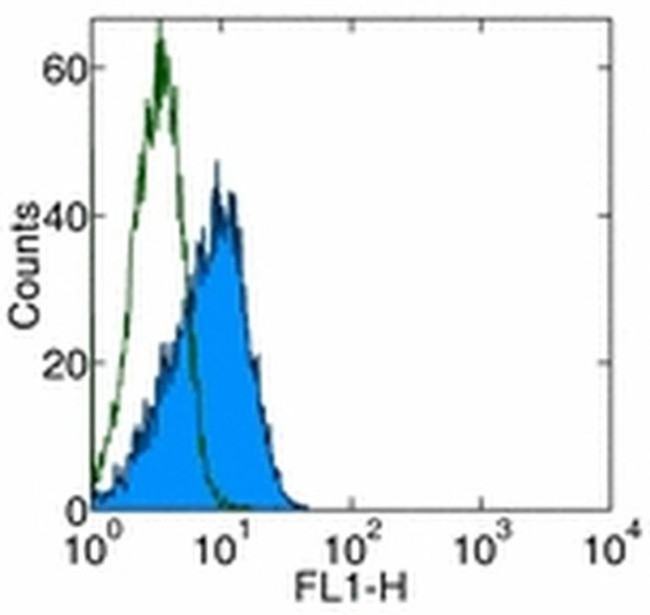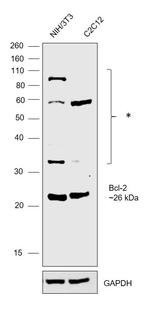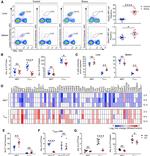Search Thermo Fisher Scientific
Invitrogen
Bcl-2 Monoclonal Antibody (10C4), eBioscience™
Product Details
14-6992-82
Species Reactivity
Published species
Host/Isotype
Class
Type
Clone
Conjugate
Form
Concentration
Purification
Storage buffer
Contains
Storage conditions
Shipping conditions
RRID
Product Specific Information
Description: The 10C4 monoclonal antibody reacts with mouse and rat Bcl-2, also known as B cell lymphoma 2. Bcl-2 is the founding member of the Bcl-2 family of evolutionarily-conserved proteins that regulate cell death/survival. Members of the Bcl-2 family include the pro-apoptotic proteins BAD, Bax, and Bim, and the anti-apoptotic proteins Bcl-2, Bcl-xL, and Mcl-1. Bcl-2 inhibits apoptosis by preventing the release of cytochrome c from the mitochondria. Mutation of Bcl-2 or overexpression of Bcl-2 due to chromosomal translocation has been identified as a contributing factor in numerous cancers. In developing thymocytes, Bcl-2 is expressed at high levels in CD4-CD8- double negative and in CD4+ and CD8+ single positive thymocytes; Bcl-2 expression is greatly diminished in CD4+CD8+ double positive thymocytes.
Applications Reported: The 10C4 antibody has been reported for use in intracellular staining followed by flow cytometric analysis, immunoprecipitation, and immunoblotting (WB). (Fluorochrome conjugated 10C4 is recommended for use in intracellular flow cytometry.).
Applications Tested: The 10C4 antibody has been tested by western blot and can be used at 1-10 µg/mL. It is recommended that the reagent be carefully titrated for optimal performance in the assay of interest.
Purity: Greater than 90%, as determined by SDS-PAGE.
Aggregation: Less than 10%, as determined by HPLC.
Filtration: 0.2 µm post-manufacturing filtered.
Target Information
BCL-2 is a key regulator of apoptosis that functions to either inhibit or promote cell death. The BCL-2 family members are also characterized by dimerizing to further modulate apoptosis. Bag1, for example, has been found to form a heterodimer with BCL-2 resulting in the enhancement of the anti-apoptotic effect of BCL-2. Bax and Bak have been shown to play a critical role in cytochrome c release from mitochondria and thus initiate apoptosis. Bax exerts a pro-apoptotic rather than an anti-apoptotic effect on cells. Constitutive expression of BCL2, such as in the case of translocation of BCL2 to Ig heavy chain locus, is thought to be the cause of follicular lymphoma. In most follicular lymphomas, neoplastic germinal centers express high levels of BCL-2 alpha protein, whereas the normal or hyperplastic germinal centers are negative. Two transcript variants of BCL-2, produced by alternate splicing, differ in their C-terminal ends. The overexpression of BCL-2 has been linked to human cancers such as B-cell lymphoma and prostate cancer.
For Research Use Only. Not for use in diagnostic procedures. Not for resale without express authorization.
Bioinformatics
Protein Aliases: Apoptosis regulator Bcl-2; B cell lymphoma 2 associated oncogene; B-cell leukemia/lymphoma 2; Bcl 2; Bcl2-like protein; OTTHUMP00000163680
Gene Aliases: AW986256; Bcl-2; Bcl2; C430015F12Rik; D630044D05Rik; D830018M01Rik
UniProt ID: (Rat) P49950, (Mouse) P10417
Entrez Gene ID: (Rat) 24224, (Mouse) 12043

Performance Guarantee
If an Invitrogen™ antibody doesn't perform as described on our website or datasheet,we'll replace the product at no cost to you, or provide you with a credit for a future purchase.*
Learn more
We're here to help
Get expert recommendations for common problems or connect directly with an on staff expert for technical assistance related to applications, equipment and general product use.
Contact tech support



